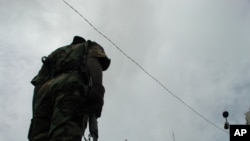As Ivory Coast prepares to celebrate 50 years of independence on August 7, impunity, a lack of elections, and the constant threat of political violence hangs over the divided country.
At a recent event in Washington, a civil society representative from Ivory Coast, Patrick Ngouan, explained Ivory Coast faces a dilemma. He said there were two options, either to deal with its history of impunity, or to give the priority to long-delayed elections.
Ngouan said he favors having a free and fair election first, and then letting the next government deal with judicial issues.
Since the 1990s, there have been a series of massacres, army uprisings and ethnic clashes across Ivory Coast which have killed thousands of people but which, in terms of justice, have gone unaccounted for.
Elections due in 2005 have been repeatedly postponed amid difficulties to implement a peace deal between northern-based rebels and President Laurent Gbagbo.
Rebels want millions of previously undocumented northerners to be able to vote, while supporters of Mr. Gbagbo say non-Ivorians should not falsify their nationality and gain voting rights.
While the question of who is an Ivorian is central to the conflict, a visiting professor at Duke University, and former journalist who covered Ivory Coast, Stephen Smith, says breaking the cycle of impunity seems impossible in the current context.
"For the peace process and for any political bargaining going on, you will always have to use justice as a bargaining chip. As soon as a few individuals are put on a list as being the spoilers, then they turn around and prove precisely that they have that power of nuisance. If you want to reach an agreement, if you want to move forward and maybe hold these elections one day, then you will need these spoilers and bring them along," he said.
Mr. Gbagbo and some of his closest supporters have denied having any link to a series of unexplained killings of prominent Ivorians in the government-run south which followed the start of the northern rebellion in late 2002.
Just hours after the rebel uprising started, the former military ruler General Robert Guei was found shot dead in the streets in his pajamas, in circumstances that also remain unclear. Since fighting between rebels, militias and the army stopped, there have also been several deadly crackdowns on civilian protests in the south, and several instances of massacres between different factions in the rebel-held north.
David Crane, the founder of U.S.-based Impunity Watch, says there is little chance of a special international court for Ivory Coast, because there have been much fewer dead than in other conflicts.
"In a cynical, war-crimes weary world that we live in, if you compare what has taken place in Cote d'Ivoire to Liberia or to Sierra Leone, it is not the greatest atrocity, and unfortunately politicians and diplomats tend to look at this for cost efficiencies and they are not going to look at this with a great deal of enthusiasm," he said.
Still, Crane says, some Ivorians, including President Gbagbo, could face international justice. Crane points to Mr. Gbagbo's past as a regional adversary of former Liberian President Charles Taylor, now facing trial for war crimes he allegedly committed in Sierra Leone.
Mr. Gbagbo has denied the claims he backed one of the rebel groups fighting against Mr. Taylor, which also fought against western-based Ivory Coast rebels.
Michael McGovern, a political anthropologist at Yale University and West Africa expert, says impunity started back 20 years ago, when the cocoa-reliant Ivorian economy started to slide.
"It has been a huge problem. I mean it has obviously been a problem for the women who have been raped, the people who have lost family members, the extrajudicial killings, but it has also become a problem in the sense that you do have a situation in which political actors have recourse to lethal violence or the kinds of violence that will terrorize populations rather than going to the ballot box," he said.
McGovern says, even if elections do take place, the violence of politics in Ivory Coast must be addressed for a working democracy to take hold.
Many commentators in Ivory Coast have also said the timing is not right for a celebration, but that reflection is needed, as well as reconciliation.
Impunity, Lack of Election, Hang Over Ivory Coast Independence Day




